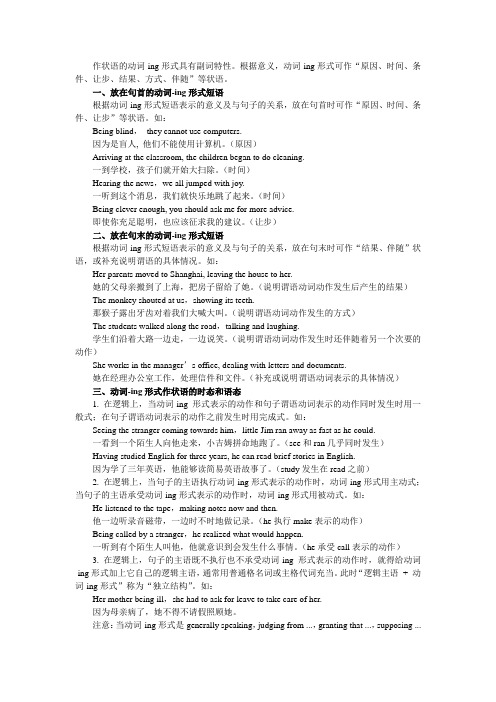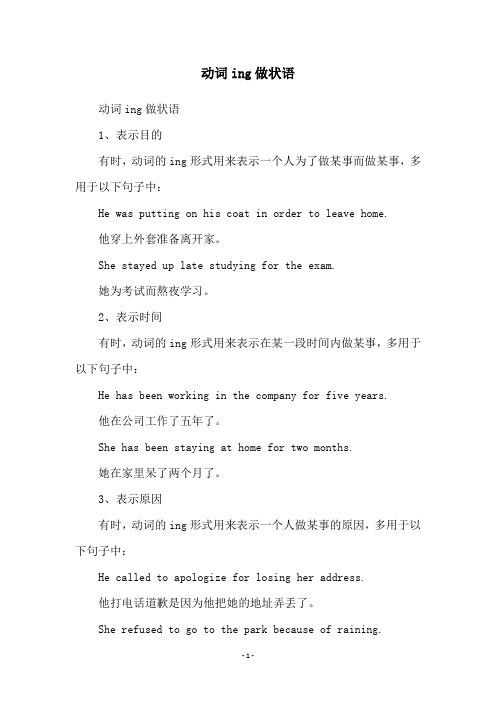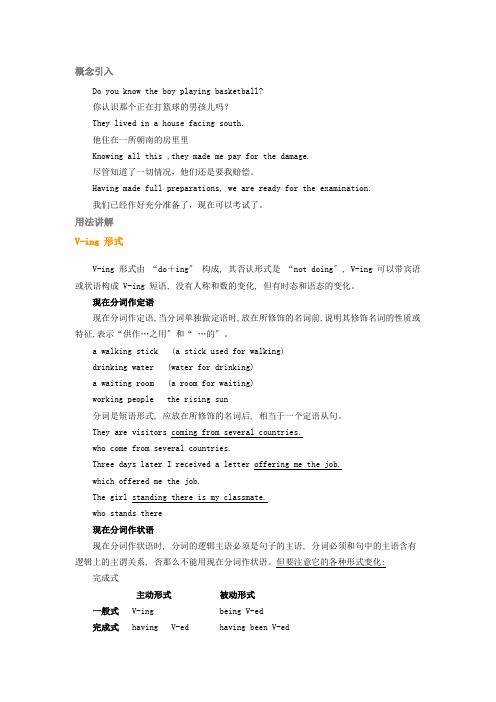动词的ing形式作状语
动词-ing形式作状语

作状语的动词-ing形式具有副词特性。
根据意义,动词-ing形式可作“原因、时间、条件、让步、结果、方式、伴随”等状语。
一、放在句首的动词-ing形式短语根据动词-ing形式短语表示的意义及与句子的关系,放在句首时可作“原因、时间、条件、让步”等状语。
如:Being blind,they cannot use computers.因为是盲人, 他们不能使用计算机。
(原因)Arriving at the classroom, the children began to do cleaning.一到学校,孩子们就开始大扫除。
(时间)Hearing the news,we all jumped with joy.一听到这个消息,我们就快乐地跳了起来。
(时间)Being clever enough, you should ask me for more advice.即使你充足聪明,也应该征求我的建议。
(让步)二、放在句末的动词-ing形式短语根据动词-ing形式短语表示的意义及与句子的关系,放在句末时可作“结果、伴随”状语,或补充说明谓语的具体情况。
如:Her parents moved to Shanghai, leaving the house to her.她的父母亲搬到了上海,把房子留给了她。
(说明谓语动词动作发生后产生的结果)The monkey shouted at us,showing its teeth.那猴子露出牙齿对着我们大喊大叫。
(说明谓语动词动作发生的方式)The students walked along the road,talking and laughing.学生们沿着大路一边走,一边说笑。
(说明谓语动词动作发生时还伴随着另一个次要的动作)She works in the manager’s office, dealing with letters and documents.她在经理办公室工作,处理信件和文件。
动词ing的五种用法

动词ing的五种用法动词的 ing 形式,也就是现在分词和动名词,在英语中有着广泛且重要的用法。
接下来,咱们就一起来详细了解一下动词 ing 的五种常见用法。
一、作主语动词 ing 形式作主语时,表示经常的、习惯性的动作或者是抽象的概念。
比如:“Swimming is my favorite sport”(游泳是我最喜欢的运动。
)在这个句子中,“swimming”就是动词 ing 形式作主语,强调游泳这个活动整体。
再比如:“Reading aloud is very helpful”(大声朗读非常有帮助。
)这里“reading aloud”作为主语,指的是大声朗读这种行为。
需要注意的是,动词 ing 形式作主语时,谓语动词要用单数形式。
二、作宾语有些动词后面只能接动词 ing 形式作宾语,常见的这类动词有:enjoy(喜欢),finish(完成),practise(练习),mind(介意),suggest(建议)等。
例如:“I enjoy reading books in my spare time”(我喜欢在业余时间读书。
)“enjoy”后面就接了“reading”这个动词 ing 形式。
“Have you finished doing your homework?”(你做完作业了吗?)“finish”后面接“doing”。
“Would you mind opening the window?”(你介意打开窗户吗?)“mind”接“opening”。
三、作表语动词 ing 形式作表语时,往往表示主语所具有的特征或性质。
例如:“The story is very interesting”(这个故事很有趣。
)“interesting”就是动词 ing 形式,用来描述“the story”的性质。
再比如:“His job is teaching English”(他的工作是教英语。
)“teaching English”作为表语,说明了他的工作内容。
19.动词-ing形式作状语

动词-ing形式作状语吴国斌动词-ing形式作状语时,可以表示时间、原因、结果、条件、方式或伴随动作,相当于相应的状语从句。
1.作时间状语(有时可以在动词-ing形式前加一个表时间的连词,如when,while等)相当于时间状语从句Hearing the news, they immediately set off for Shanghai.=When they heard the news, they immediately set off for Shanghai.听到这个消息,他们立即动身去上海。
Having turned off the TV set, he began to go over his lessons.=After turning off the TV set, he began to go over his lessons.关掉电视机以后,他便开始复习功课。
2.作原因状语,相当于原因状语从句Being too young, he couldn’t join the army.=As he was too young, he couldn’t join the army.因为年幼,他不能参军。
Not knowing how to get there, I had to ask the way.=As I did not know how to get there, I had to ask the way.因为不知道如何到那里,我只得问路。
3.作条件状语,相当于条件状语从句Using your head, you’ll find a good way.=If you use your head, you’ll find a g ood way.动动脑,你就会想出一个好办法。
Driving too fast, you will damage the car.=If you drive too fast, you will damage the car.如果开车太快,你会把车子弄坏的。
动词ing做状语

动词ing做状语
动词ing做状语
1、表示目的
有时,动词的ing形式用来表示一个人为了做某事而做某事,多用于以下句子中:
He was putting on his coat in order to leave home.
他穿上外套准备离开家。
She stayed up late studying for the exam.
她为考试而熬夜学习。
2、表示时间
有时,动词的ing形式用来表示在某一段时间内做某事,多用于以下句子中:
He has been working in the company for five years.
他在公司工作了五年了。
She has been staying at home for two months.
她在家里呆了两个月了。
3、表示原因
有时,动词的ing形式用来表示一个人做某事的原因,多用于以下句子中:
He called to apologize for losing her address.
他打电话道歉是因为他把她的地址弄丢了。
She refused to go to the park because of raining.
她因为下雨而拒绝去公园。
动词ing形式作状语

三、表示条件(多置于句首)例:
1. Working hard(=If you work hard), you will succeed.
四、表示结果(多置于句末)例:
1. The snow lasted a week, leading to a serious traffic jam in the area.
2. The visiting minister expressed his satisfaction with the talks, ___ that he had enjoyed his stay here. A. having added B. to add C. adding D. added
注意:-ing形式的完成式having done 表示其动作发生在谓语动词 的动作之前,一般作时间或原因状 the homework, she went shopping. =When she had finished the homework, she went shopping.
5、_____ from his clothes, he is not so poor. A. Judged C. To judge B. Judging D. Judge
6、_____ such heavy pollution already, it may now be too late to clean the river. A. Having suffered B. Suffering C. To suffer D. Suffered
3、European football is played in 80 countries, ____ it the most popular sport in the world. A. making B. makes C. made D. to make
动词-ing形式作定语和状语

概念引入Do you know the boy playing basketball?你认识那个正在打篮球的男孩儿吗?They lived in a house facing south.他住在一所朝南的房里里Knowing all this ,they made me pay for the damage.尽管知道了一切情况,他们还是要我赔偿。
Having made full preparations, we are ready for the examination.我们已经作好充分准备了,现在可以考试了。
用法讲解V-ing 形式V-ing 形式由“do+ing〞构成, 其否认形式是“not doing〞, V-ing 可以带宾语或状语构成 V-ing 短语, 没有人称和数的变化, 但有时态和语态的变化。
现在分词作定语现在分词作定语,当分词单独做定语时,放在所修饰的名词前,说明其修饰名词的性质或特征,表示“供作…之用〞和“…的〞。
a walking stick (a stick used for walking)drinking water (water for drinking)a waiting room (a room for waiting)working people the rising sun分词是短语形式, 应放在所修饰的名词后, 相当于一个定语从句。
They are visitors coming from several countries.who come from several countries.Three days later I received a letter offering me the job.which offered me the job.The girl standing there is my classmate.who stands there现在分词作状语现在分词作状语时, 分词的逻辑主语必须是句子的主语, 分词必须和句中的主语含有逻辑上的主谓关系, 否那么不能用现在分词作状语。
ing做状语经典例句

ing做状语经典例句在英语中,ing作状语是动词的一种非谓语形式,它在句子中可以表示行为或状态的特征或方式。
以下是几个ing作状语的经典例句:1. He sat there reading a newspaper.(他坐在那里读报纸。
)在这个句子中,“reading a newspaper”是状语,表示“他”的状态是正在读报纸。
2. She came running to me.(她跑过来找我。
)在这个句子中,“running”是状语,表示“她”过来的方式是跑着来的。
3. He loved hiking in the mountains.(他喜欢在山里徒步旅行。
)在这个句子中,“hiking in the mountains”是状语,表示“他”喜欢做的事情是在山里徒步旅行。
4. I was surprised to find him crying in the corner.(我惊讶地发现他在角落里哭泣。
)在这个句子中,“crying in the corner”是状语,表示“他”的状态是在角落里哭泣。
5. She swam across the river to reach the other side.(她游过河到达了另一边。
)在这个句子中,“across the river”是状语,表示“她”游泳的方式是横着游过河。
6. He jumped up and down excitedly.(他兴奋地跳上跳下。
)在这个句子中,“excitedly”是状语,表示“他”跳跃的方式是因为兴奋而跳跃。
7. She sang beautifully, much to our surprise.(她唱得很美,让我们大吃一惊。
)在这个句子中,“beautifully”是状语,表示“她”唱歌的方式是唱得很美。
8. He lay in bed, awake all night.(他躺在床上,整夜没睡。
)在这个句子中,“awake all night”是状语,表示“他”的状态是整夜保持清醒。
动词-ing形式作宾补和状语

8. I left children ____(watch) television.
9. The policeman caught two boys ____(fight) in the street. 10. With the exam ____(draw)near, we all felt anxious. keys:1. lying 2. grow 3. rising 4. hoping 5. adding 6. Not having received 7. Having suffered 8. watching 9. fighting 10. drawing
(2)I often hear him sing this song.我经常 听到他唱这首歌。
注:①see sb./sth. doing变成被动语态,其 结构是sb./sth. be seen doing,doing在这里成 了主语补足语。 The missing boy were last seen playing near the river。那个失踪的男孩最后一次被看到是 在河边玩耍。
Working in the factory, she made a lot of factory. 在工厂工作期间,她交了很多朋 友。
Being ill, the boy didn’t come to school.因为 病了,那个男孩没有来学校。
Working hard, you will succeed.努力学习, 你就会成功。
Not knowing his telephone number, we couldn' t get in touch with him. 由于不知道 他的电话号码,我们没法与他联系。
- 1、下载文档前请自行甄别文档内容的完整性,平台不提供额外的编辑、内容补充、找答案等附加服务。
- 2、"仅部分预览"的文档,不可在线预览部分如存在完整性等问题,可反馈申请退款(可完整预览的文档不适用该条件!)。
- 3、如文档侵犯您的权益,请联系客服反馈,我们会尽快为您处理(人工客服工作时间:9:00-18:30)。
动词的ing形式作状语
动词-ing形式作状语
动词-ing形式可以作状语,在句中表示时间、原因、结果、条件、让步、行为方式或伴随情况等。
动词-ing形式作时间、原因、条件、让步状语时多位于句首;作结果、伴随情况状语时常位于句末。
1 表示时间,相当于一个时间状语从句。
Having made full preparations, we are ready for the examination.
我们已经作好了充分准备,现在可以应考了。
(= After we have made full preparations...)
When I heard the result, I couldn't help jumping.
= Hearing the result, I couldn’t help jumping.
动词-ing所表示的动作一发生,谓语动词表示的动作就立即发生。
When I was playing games, I was very excited.
= When playing games, I was very excited.
动词-ing所表示的动作在进行过程中,谓语动词表示的动作就发生了,此时前面一般加上when, while.
Eg: Be careful when you are crossing the street.
= Be careful when crossing the street.
After I had played games, I went to sleep.
=Having played games, I went to sleep.
动词-ing发生在谓语动词之前,要用现在分词的完成式。
2 表示原因,相当于一个原因状语从句。
Being ill, he didn't go to school yesterday.
由于生病,他昨天没有上学。
(= Since he was ill...)
Because I didn’t master the way of studying, I didn’t get a good result.
= Not mastering the way of studying, I didn’t get a good result.
As I was so worried, I couldn’t go to sleep.
= Being so worried, I couldn’t go to sleep.
3 表示结果,相当于一个并列谓语。
His father died, leaving him a lot of money.
= and left him a lot of money.
他父亲死了,留给他许多钱.
4 表示条件,相当于一个条件状语从句。
Working hard at your lessons, you will succeed.
=If you work h ard at your lessons…
如果你努力学习,就一定能成功。
If you pass the three years, you’ll grow up.
= Passing the three years, you’ll grow up.
If you don’t make use of the time, you’ll regret.
= Not making use of the time, you’ll regret.
5 表示让步,相当于一个让步状语从句。
Knowing all this, they made me pay for the damage.
= Although they knew all this...
尽管知道了一切情况,他们还是要我赔偿损失。
Although I studied from morning till night, I didn’t pass the exam.
= Studying from morning till night, I didn’t pass the exam.
Even though I made up my mind, I still wanted to play.
= Making made up my mind, I still wanted to play.
6 表示行为方式、伴随情况或补充说明,相当于一个并列结构。
He lay on the grass, staring at the sky for a long time.
= ...and stared at the sky for a long time
他躺在草地上,长时间地望着天空。
一般情况下,动词-ing所表示的动作和谓语动词所表示的动作同时发生,它没有相应的状语从句可以转换,但可以用并列句转换。
The girl came into the classroom, singing and dancing.
= The girl came into the classroom and they sang and danced.。
